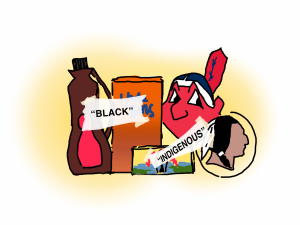Rebranding Does Not Equal Racial Equality
March 24, 2021
Despite the continuous fight for racial equality following last year’s protests, companies and franchises should not be rebranding products that feature Black people or Native Americans because they celebrate the history and culture of the people.
Several of the products and logos that have been rebranded include Aunt Jemima, Uncle Ben, Washington Redskins, Land O’Lakes, Cleveland Indians and some of Dr. Seuss’ novels because the companies themselves feared they represented racial stereotypes.
Black women who have portrayed Aunt Jemima throughout the past century have spoken out against the decision to rebrand the product, according to NBC. Quaker Oats, the parent company for Aunt Jemima, said their decision to rebrand will make progress towards racial equality.
Vera Harris, whose great aunt Lillian Richard traveled the country promoting the Quaker Oats brand and portraying the Aunt Jemima character for over 20 years, has publicly disagreed with the Quaker Oats decision.
“I understand what Quaker Oats is doing because I’m Black, and I don’t want a negative image promoted; however, I just don’t want her legacy lost, because if her legacy is swept under the rug and washed away, it’s as if she never was a person,” Harris said in an interview with NBC News.
NBC also reports that many black women like Harris believe that future generations will not remember Aunt Jemima or Uncle Ben because they will have little to no memory of their existence. The Aunt Jemima character represented the history of black culture in the United States since the mid-nineteenth century, with Uncle Ben doing the same since the mid-twentieth century.
Controversy has also arisen in literature. Six Dr. Seuss books, including “If I Ran the Zoo” and “On Beyond Zebra!,” will be removed from publication because of their portrayal of different cultures in an insensitive way, according to CNN.
Regardless of these claims, family members of Dr. Seuss said that he was not a racist.
“There wasn’t a racist bone in that man’s body — he was so acutely aware of the world around him and cared so much,’’ the late author’s stepdaughter Lark Grey Dimond-Cates said, according to the New York Post.
The effort to remove Black products extended to Native Americans, who are commonly showcased in sports and food brands, for the same reasons.
Sports teams such as the Washington Redskins and the Cleveland Indians announced plans to rebrand their names later this year, while popular butter brand Land O’Lakes removed the Native American women portrayed on its packaging, according to CNN. However, the Chicago Blackhawks stands by its logo depicting a Native American person.
“We celebrate Black Hawk’s legacy by offering ongoing reverent examples of Native American culture, traditions and contributions, providing a platform for genuine dialogue with local and national Native American groups,” the Chicago Blackhawks team said in a statement. “As the team’s popularity grew over the past decade, so did that platform and our work with these important organizations.”
These logos, whether Black or Native American, are actually giving these people representation in America. It is surprising to see that liberal activists, who want to achieve racial equality, are instead dismantling the products that display representation in pop culture. Similar to the Chicago Blackhawks, companies should release statements clarifying that their brands are reflective of the rich, positive histories of cultural communities rather than just “canceling” them.




